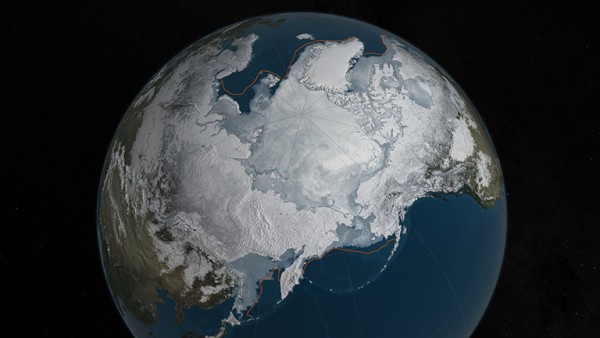By Ana Verayo, | November 21, 2016

Arctic sea ice is at a record low wintertime maximum extent for the second straight year. (NASA Goddard's Scientific Visualization Studio/C. Starr)
The North Pole is experiencing some seriously disturbing changes, as temperatures soar above freezing, revealing telltale signs that the planet's climate is in trouble.
According to new data from the United States Weather Channel, more than five buoys registered temperatures from zero to 1.2 degrees last week. Coincidentally, certain regions of central Russia are currently suffering from frigid temperatures of minus 40 degrees.
Like Us on Facebook
According to the head of Cambridge University's Polar Ocean Physics Group, Peter Wadhams, such dramatic tempearture change in the Arctic Circle at this time of year is unheard of. Temperatures above freezing at this time of the year is really remarkable, but in the past six years it has become a pattern due to global warming.
Wadhams explains that this sudden temperature change is due to a jet stream of high altitude winds in the North Pole that flows around the world, which has a huge impact on global weather systems.
Sea ice is now retreating in the Arctic Ocean and it releases warmer air during the summer all over the Arctic region. This warm air causes this jet stream to slow down. This jet stream brings warmer air up to the Arctic and sends colder air to the tropical regions, in the opposite directions.
Climate scientists say that this is becoming a trend due to fast rising sea levels as well as global warming and climate change. Coastal areas are likely to be the first ones to suffer from devastating floods due to this trend.
This year, Arctic sea ice has been below the average of between 1981 to 2010. Wadhams predicts that the ice in the North Pole will disappear in the next few years. Some say this will occur anytime between 2030 to 2050.
-
Use of Coronavirus Pandemic Drones Raises Privacy Concerns: Drones Spread Fear, Local Officials Say

-
Coronavirus Hampers The Delivery Of Lockheed Martin F-35 Stealth Fighters For 2020

-
Instagram Speeds Up Plans to Add Account Memorialization Feature Due to COVID-19 Deaths

-
NASA: Perseverance Plans to Bring 'Mars Rock' to Earth in 2031

-
600 Dead And 3,000 In The Hospital as Iranians Believed Drinking High-Concentrations of Alcohol Can Cure The Coronavirus

-
600 Dead And 3,000 In The Hospital as Iranians Believed Drinking High-Concentrations of Alcohol Can Cure The Coronavirus

-
COVID-19: Doctors, Nurses Use Virtual Reality to Learn New Skills in Treating Coronavirus Patients







